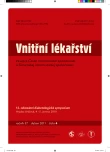-
Medical journals
- Career
Diabetes mellitus and the liver cirrhosis
Authors: T. Fejfar 1; V. Šafka 2; V. Jirkovský 1; J. Štefánková 3; P. Hůlek 1
Authors‘ workplace: II. interní klinika Lékařské fakulty UK a FN Hradec Králové, přednosta prof. MUDr. Jaroslav Malý, CSc. 1; Ústav fyziologie Lékařské fakulty Hradec Králové, přednostka prof. MUDr. Zuzana Červinková, CSc. 2; Diabetologická ambulance Hradec Králové 3
Published in: Vnitř Lék 2011; 57(4): 368-371
Category: 12th national Symposium diabetes, "Diabetes and Gastroenterology", Hradec Kralove, 4 to 5 June 2010
Overview
Patients with liver cirrhosis have increased risk of diabetes mellitus development, especially when the underlying disease is hereditary hemochromatosis, autoimune hepatitis, non-alcoholic steatohepatitis or chronic hepatitis C. Patients with associated diabetes according to liver cirrhosis complications have worse prognosis and the therapy is influenced by both diseases. The authors bring short review of particular diseases, diagnosis and treatment strategy.
Key words:
liver cirrhosis – diabetes mellitus
Sources
1. Bianchi G, Marchesini G, Zoli M et al. Prognostic significance of diabetes in patients with cirrhosis. Hepatology 1994; 20 : 119–125.
2. Lai MS, Hsieh MS, Chiu YH et al. Type 2 diabetes and hepatocellular carcinoma: A cohort study in high prevalence area of hepatitis virus infection. Hepatology 2006; 43 : 1295–1302.
3. Donadon V, Balbi M, Mas MD et al. Metformin and reduced risk of hepatocellular carcinoma in diabetic patients with chronic liver disease. Liver Int 2010; 30 : 750–758.
4. Horák J. Genetická hemochromatóza. In: Ehrmann J, Hůlek P et al (eds). Hepatologie. 1. vyd. Praha: Grada 2010 : 339–345.
5. DuBois S, Kowdley V. Review article: targeted screening for hereditary haemochromatosis in high-risc groups. Aliment Pharmacol Ther 2004; 20 : 1–14.
6. Aytug S, Reich D, Sapiro LE et al. Impaired IRS-1/PI3-kinase signalling in patients with HCV: a mechanism for increase prevalence of type 2 diabetes. Hepatology 2003; 38 : 1384–1392.
7. Alaei M, Negro R. Hepatitis C virus and glucose and lipid metabolism. Diabetes Metab 2008; 34 : 692–700.
8. Romeo-Gómez M, Fernández-Rodriguez CM, Andrare RJ at al. Effect of sustained virological response to treatment on the incidence of abnormal glucose values in chronic hepatitis C. J Hepatol 2008; 48 : 721–727.
9. Donadon V, Balbi M, Ghersetti M et al. Antidiabetic therapy and increased risk of hepatocellular carcinoma in chronic liver disease. World J Gastroenterol 2009; 15 : 2506–2511.
10. Keating GM, Santoro A. Sorafenib: a review of its use in advanced hepatocellular carcinoma. Drugs 2009; 69 : 223–240.
11. Salpeter SR, Greyber E, Pasternak GA et al. Risk of fatal and nonfatal lactic acidosis with metformin use in type 2 diabetes mellitus. Cochrane Database Syst Rev 2010; 20: CD002967.
12. Romero-Gómez M, Diago M, Andrade RJ et al. Spanish Treatment of Resistance to Insulin in Hepatitis C Genotype 1 Group. Treatment of insulin resistance with metformin in naïve genotype 1 chronic hepatitis C patients receiving peginterferon alfa-2a plus ribavirin. Hepatology 2009; 50 : 1702–1708.
Labels
Diabetology Endocrinology Internal medicine
Article was published inInternal Medicine

2011 Issue 4-
All articles in this issue
- Diabetes mellitus and the oral cavity
- Xerostomia, hyposialia, sicca syndrome – quantitative disturbances of the salivary flow rate
- Peptic ulcer disease in patients with diabetes mellitus
- Motility disorders and gastric emptying in diabetes mellitus. Current diagnostics and treatment
- Current trends of surgical therapy of focal liver and pancreatic lesions
- Steatosis and steatohepatitis in diabetic patient
- Diabetes mellitus and the liver cirrhosis
- Acute pancreatitis in diabetics
- Coeliac disease and diabetes
- Colorectal cancer and diabetes
- Analogues of amylin, α-glucosidase inhibitors and the digestive system in homeostasis regulation
- Autonomic neuropathy of the gastrointestinal tract
- Dyspeptic syndrome associated with antidiabetic therapy
- Metabolic surgery – the most effective diabetes treatment
- Metabolic surgery – a new approach to the management of selected diseases
- Incretin hormones
- Treatment of type 2 diabetes mellitus with GLP-1 antagonists
- Incretin therapy and the metabolic syndrome
- Internal Medicine
- Journal archive
- Current issue
- Online only
- About the journal
Most read in this issue- Xerostomia, hyposialia, sicca syndrome – quantitative disturbances of the salivary flow rate
- Treatment of type 2 diabetes mellitus with GLP-1 antagonists
- Autonomic neuropathy of the gastrointestinal tract
- Diabetes mellitus and the liver cirrhosis
Login#ADS_BOTTOM_SCRIPTS#Forgotten passwordEnter the email address that you registered with. We will send you instructions on how to set a new password.
- Career

